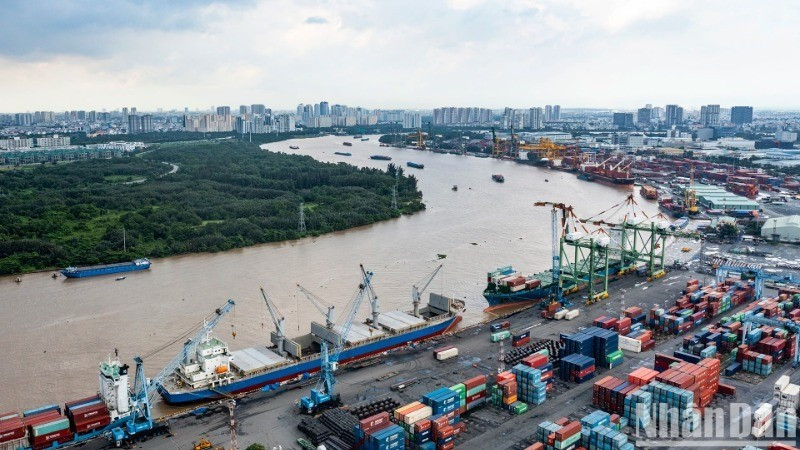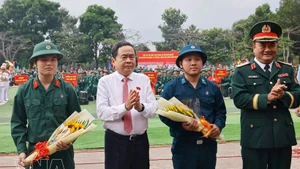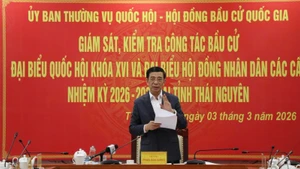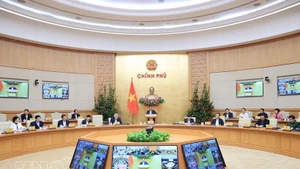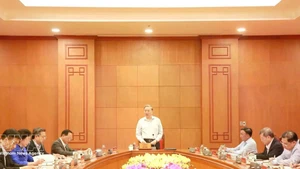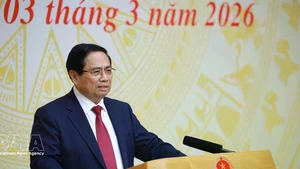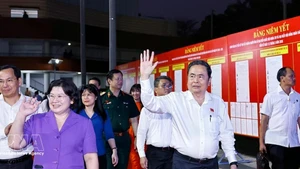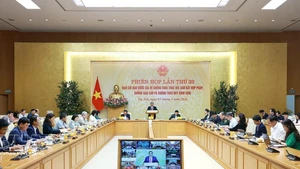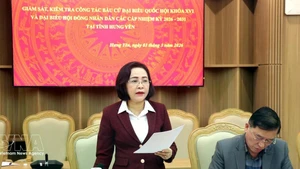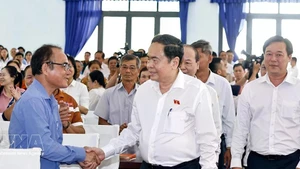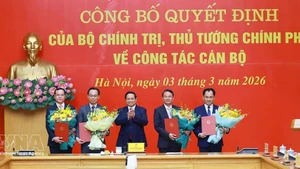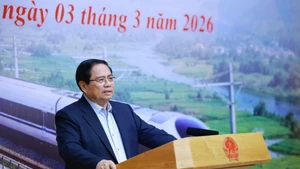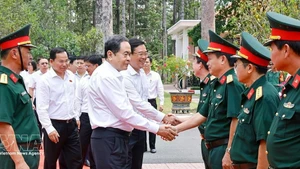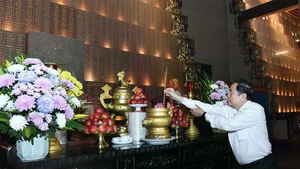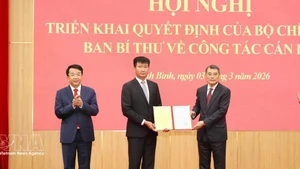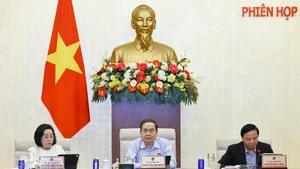After 40 years of renewal, Viet Nam has attained new stature, potential, position, and prestige. However, alongside development opportunities, the country is facing many challenges from the international environment and from the internal socio-economic context. To achieve the objectives set for 2030 and the vision toward 2045, it is essential to strongly promote the lessons learned, unblock resources, and create momentum for breakthrough.
This forms the theoretical and practical foundation enabling the Party to continue leading creative renewal, firmly following the path towards socialism.
1. Practical experience over the past 40 years affirms that the renewal path initiated and led by our Party is completely correct, suited to Viet Nam’s realities and aligned with the development trends of the times. Viet Nam, once a poor country, has risen to become a nation with solid foundations, improving living standards, and an increasingly elevated international position.
In this success, it must be emphasised that steadfastness in the goal of socialism, grounded in Marxism–Leninism and Ho Chi Minh Thought, plays an overriding role in ensuring the correct development orientation. National development is inseparable from national defence.
In the context of fierce global strategic competition, with both traditional and non-traditional security challenges strongly affecting national sovereignty, Viet Nam has consistently been proactive, resolute, and persistent in firmly safeguarding independence, sovereignty, unity, and territorial integrity; proactively preventing and protecting the country from afar and from early on; and combining the strength of the nation with the strength of the times through deep international integration.
The Communist Party of Viet Nam is the decisive factor in every victory of the revolution. Throughout its development, our Party has always focused on building a pure, strong, and comprehensive Party and political system; enhancing leadership capacity, fighting strength, mettle, intellect, and prestige. As President Ho Chi Minh reminded us: “Unity is our strength.”
Therefore, strengthening unity and consolidating the people’s trust in the Party are fundamental and strategic tasks.
The renewal process has achieved great accomplishments, yet corruption, wastefulness, and moral degradation still occur among a segment of officials, including high-ranking ones. This not only causes resource losses but also undermines the Party’s prestige.
In reality, our Party has remained consistent and resolute in preventing and combating corruption and reinforcing the role of exemplary conduct, especially among leaders, considering this a central and regular task to consolidate social trust and the internal strength of the political system. The people are simultaneously the objective, subject, and driving force of the revolutionary cause. All Party guidelines and policies are for the people, by the people, and rely on the people.
Practical experience in the renewal process shows that the will, creativity and support of the people have created the success of renewal. Our Party has always relied on the people, strengthened trust, promoted the people's ownership and creativity, expanded democracy, ensured legitimate rights, and strengthened national great unity to create sustainable development resources. Renewal must be comprehensive and synchronous across all fields, linked with selecting priorities and focal points to generate spill-over effects.
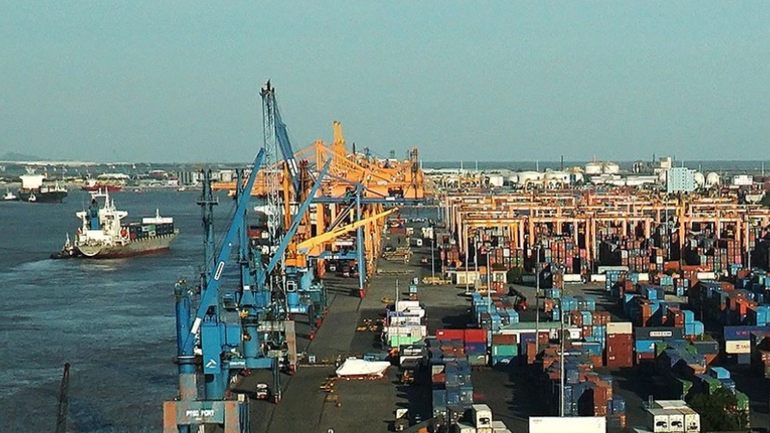
Practical development clearly shows that, along with renewing and innovating guidelines, the Party has decisively renewed the implementation stage which has long been considered the “weak link” in the application of Party resolutions; promoted the role, responsibility, proactiveness, and willingness to think and act boldly among officials, especially leaders; and encouraged strategic, creative, flexible, and effective thinking.
In leadership, the Party always requires adherence to objective laws, avoiding conservatism, dogmatism, and opportunism. Many recent violations stemmed from imposed thinking and lack of democracy, leading to serious consequences.
Therefore, preventing subjectivity and voluntarism is a vital principle in leadership and governance. Renewal is not only socio-economic reform but also a process of building a sound theoretical foundation on socialism and Viet Nam’s development path.
There is a need to tightly combine practical review with theoretical research, and link guideline formulation with institutionalisation and implementation. In practice, some resolutions were issued but were slowly institutionalised or implemented, reducing the effectiveness of renewal. Thus, it is necessary to properly handle the relationships between “theory–institutions–action”, ensuring continuity and consistency in implementation.
2. Four decades of renewal mark a historic journey of the Vietnamese nation — a journey of transformation, creativity, and the aspiration to rise. Entering a new era of development, Viet Nam faces both great opportunities and considerable challenges.
Globally, the Fourth Industrial Revolution is creating revolutionary changes in production models, value chains, governance methods, and social structures.

Strategic competition among major powers, global supply chain shifts, and non-traditional security challenges (climate, energy, data, etc.) require nations to possess high adaptability, long-term vision, and strong innovation capacity.
Domestically, after 40 years of continuous growth, Viet Nam has achieved significant progress: as of 2025, the economy has exceeded 510 billion USD, per capita income has reached around 5,000 USD, poverty rates have fallen sharply, society remains stable, and people’s living conditions have improved.
However, new challenges are becoming increasingly evident: labour productivity and technological capacity remain low, while the quality of human resources is insufficient for new development demands. Compared with the region, risks of lagging behind, the middle-income trap, and innovation gaps remain considerable.
In addition, digital transformation, the green economy, sustainable development, and modern governance are becoming global trends. Viet Nam must define a new growth model based on science, technology, innovation, and digital transformation.
In this context, promoting lessons learned from 40 years of renewal is an objective and strategic requirement. These lessons form a set of success formulas validated through practical development; promoting them is not merely revisiting the past but unlocking the keys to solving challenges of rapid and sustainable growth. They ensure continuity in long-term vision and consistency in strategic development principles.
It is necessary to transform past lessons into predictive and innovative capabilities; integrate development experience with institutional reform and modern national governance; and spread a strong renewal mindset throughout society so that these lessons become drivers of present-day action, not just remnants of the past. Promoting the past 40 years of lessons requires bold renewal in both thinking and action.
First, promoting the lesson on renewing thinking and strategic vision requires elevating development thinking towards openness–digitalisation–creativity–humanity as well as improving strategic autonomy, policy-making capacity, strategic forecasting, and risk governance.
Second, institutions, especially institutions of the socialist-oriented market economy, should be refined for rapid and sustainable development; promoting the role of the private sector, a facilitating State, and sustainable cooperatives.
Third, regarding human beings and human resources, there must be a strong shift from qualification-based training to competency-based training, emphasising digital skills, creativity, comprehensive, equitable, and high-quality education.
Fourth, multi-lateralised diplomacy should continue, leveraging free trade agreements and attracting selective investment linked with technology transfer and gradual mastery.
Fifth, we should continue to build and rectify the Party to be pure and strong in all aspects, preventing and combating corruption, wastefulness, and misconduct while streamlining the apparatus and promoting digital government, digital economy, and digital citizenship.
Sixth, in promoting the role of culture, we should consider culture not only as a driver and endogenous resource but also as a regulatory system of development, nurturing the aspiration for a prosperous, strong, and happy Viet Nam.
Forty years of renewal have demonstrated the immense internal strength of the Vietnamese nation — the strength of innovative thinking, aspiration for advancement, and the Party’s wise leadership. Promoting these valuable lessons in the new era is the surest way for Viet Nam to advance more firmly and confidently on the journey of building a prosperous, strong, civilised, and happy nation.
